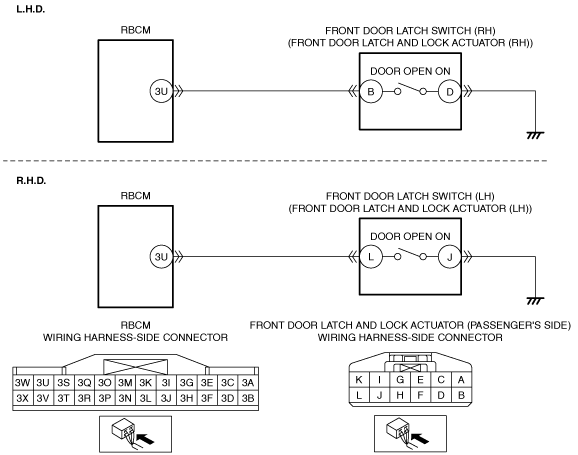|
2
|
INSPECT FRONT DOOR LATCH AND LOCK ACTUATOR (PASSENGER'S SIDE) CONNECTOR CONDITION
• Switch the ignition off.
• Disconnect the negative battery cable.
• Disconnect the front door latch and lock actuator (passenger's side) connector.
• Inspect the connector engagement and connection condition and inspect the terminals for damage, deformation, corrosion, or disconnection.
• Is the connector normal?
|
Yes
|
Go to the next step.
|
|
4
|
INSPECT REAR BODY CONTROL MODULE (RBCM) CONNECTOR CONDITION
• Disconnect the rear body control module (RBCM) connector.
• Inspect the connector engagement and connection condition and inspect the terminals for damage, deformation, corrosion, or disconnection.
• Is the connector normal?
|
Yes
|
Go to the next step.
|
|
5
|
INSPECT FOR SHORT TO GROUND IN FRONT DOOR LATCH SWITCH (PASSENGER'S SIDE) CIRCUIT
• Verify that the rear body control module (RBCM) and front door latch and lock actuator (passenger's side) connectors are disconnected.
• Inspect for continuity between the following terminal (wiring harness-side) and body ground:
-
― Front door latch and lock actuator (RH) terminal B (L.H.D.)
― Front door latch and lock actuator (LH) terminal L (R.H.D.)
• Is there continuity?
|
Yes
|
Refer to the wiring diagram and verify whether or not there is a common connector between the following terminals:
• Rear body control module (RBCM) terminal 3U—Front door latch and lock actuator (RH) terminal B (L.H.D.)
• Rear body control module (RBCM) terminal 3U—Front door latch and lock actuator (LH) terminal L (R.H.D.)
If there is a common connector:
• Determine the malfunctioning part by inspecting the common connector and the terminal for corrosion, damage, or pin disconnection, and the common wiring harness for a short to ground.
• Repair or replace the malfunctioning part.
If there is no common connector:
• Repair or replace the wiring harness which has a short to ground.
Go to the next step.
|
